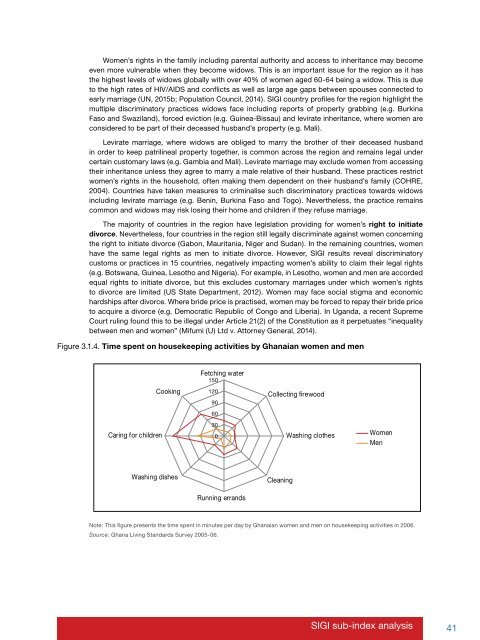SUB-SAHARAN AFRICA
Brochure_SIGI_SSA_web
Brochure_SIGI_SSA_web
Create successful ePaper yourself
Turn your PDF publications into a flip-book with our unique Google optimized e-Paper software.
Women’s rights in the family including parental authority and access to inheritance may become<br />
even more vulnerable when they become widows. This is an important issue for the region as it has<br />
the highest levels of widows globally with over 40% of women aged 60-64 being a widow. This is due<br />
to the high rates of HIV/AIDS and conflicts as well as large age gaps between spouses connected to<br />
early marriage (UN, 2015b; Population Council, 2014). SIGI country profiles for the region highlight the<br />
multiple discriminatory practices widows face including reports of property grabbing (e.g. Burkina<br />
Faso and Swaziland), forced eviction (e.g. Guinea-Bissau) and levirate inheritance, where women are<br />
considered to be part of their deceased husband’s property (e.g. Mali).<br />
Levirate marriage, where widows are obliged to marry the brother of their deceased husband<br />
in order to keep patrilineal property together, is common across the region and remains legal under<br />
certain customary laws (e.g. Gambia and Mali). Levirate marriage may exclude women from accessing<br />
their inheritance unless they agree to marry a male relative of their husband. These practices restrict<br />
women’s rights in the household, often making them dependent on their husband’s family (COHRE,<br />
2004). Countries have taken measures to criminalise such discriminatory practices towards widows<br />
including levirate marriage (e.g. Benin, Burkina Faso and Togo). Nevertheless, the practice remains<br />
common and widows may risk losing their home and children if they refuse marriage.<br />
The majority of countries in the region have legislation providing for women’s right to initiate<br />
divorce. Nevertheless, four countries in the region still legally discriminate against women concerning<br />
the right to initiate divorce (Gabon, Mauritania, Niger and Sudan). In the remaining countries, women<br />
have the same legal rights as men to initiate divorce. However, SIGI results reveal discriminatory<br />
customs or practices in 15 countries, negatively impacting women’s ability to claim their legal rights<br />
(e.g. Botswana, Guinea, Lesotho and Nigeria). For example, in Lesotho, women and men are accorded<br />
equal rights to initiate divorce, but this excludes customary marriages under which women’s rights<br />
to divorce are limited (US State Department, 2012). Women may face social stigma and economic<br />
hardships after divorce. Where bride price is practised, women may be forced to repay their bride price<br />
to acquire a divorce (e.g. Democratic Republic of Congo and Liberia). In Uganda, a recent Supreme<br />
Court ruling found this to be illegal under Article 21(2) of the Constitution as it perpetuates “inequality<br />
between men and women” (Mifumi (U) Ltd v. Attorney General, 2014).<br />
3.1.4<br />
Figure 3.1.4. Time spent on housekeeping activities by Ghanaian women and men<br />
Fetching water<br />
150<br />
Cooking<br />
120<br />
90<br />
Collecting firewood<br />
60<br />
Caring for children<br />
30<br />
0<br />
Washing clothes<br />
Women<br />
Men<br />
Washing dishes<br />
Cleaning<br />
Running errands<br />
Note: This figure presents the time spent in minutes per day by Ghanaian women and men on housekeeping activities in 2006.<br />
Source: Ghana Living Standards Survey 2005-06.<br />
SIGI sub-index The analysis SIGI 41



